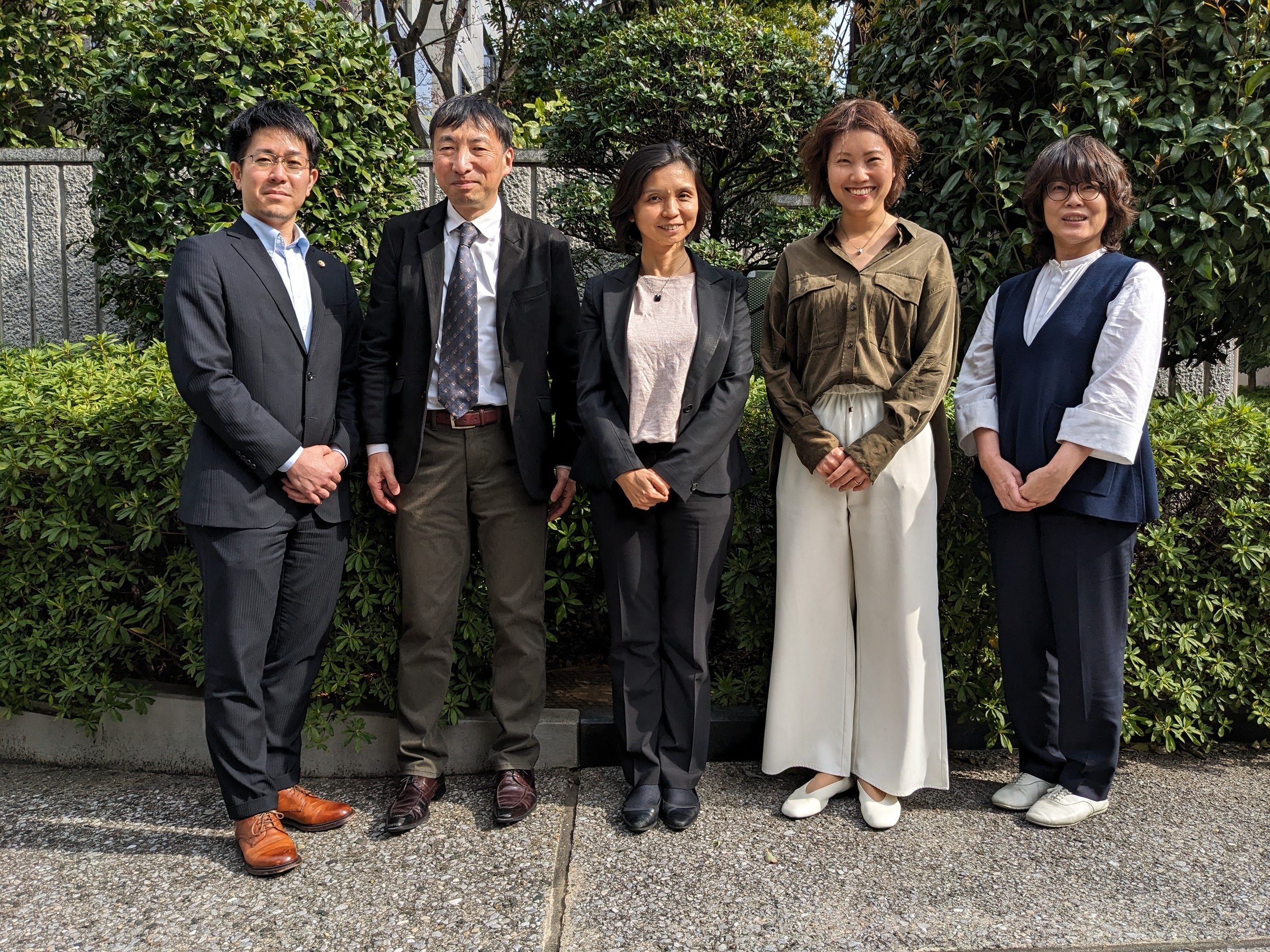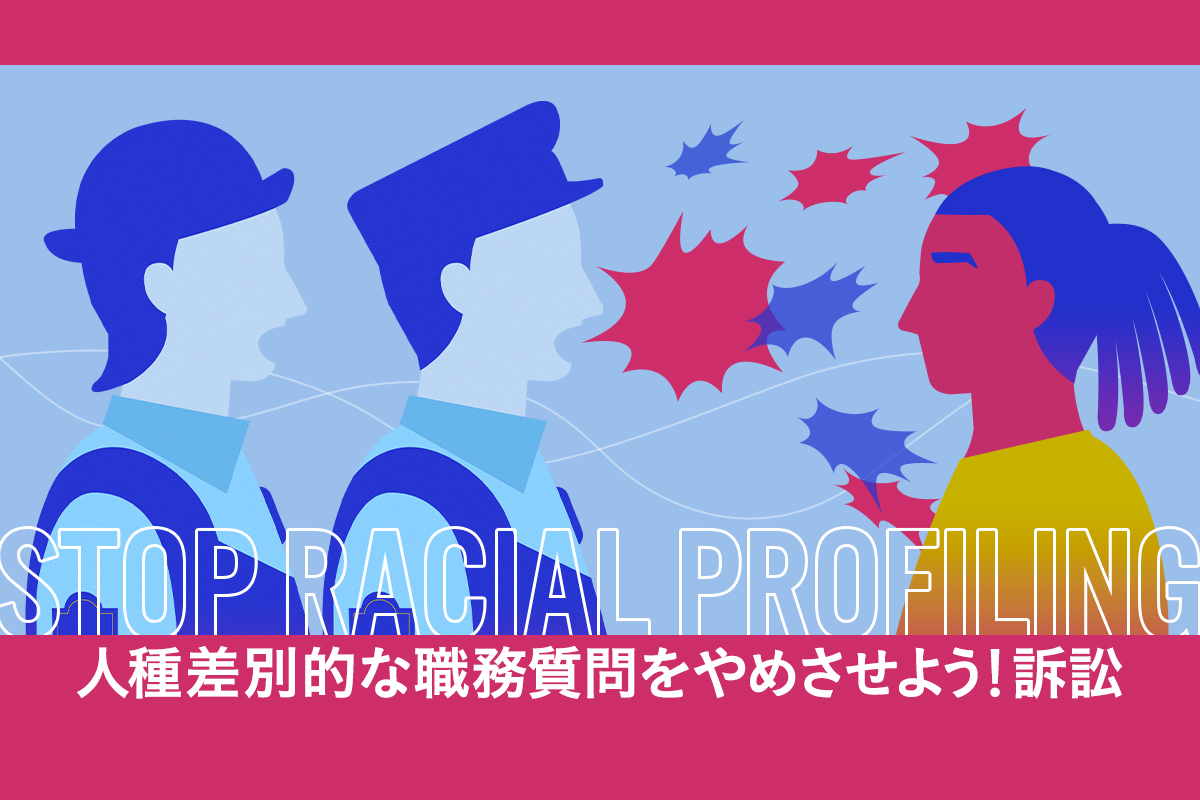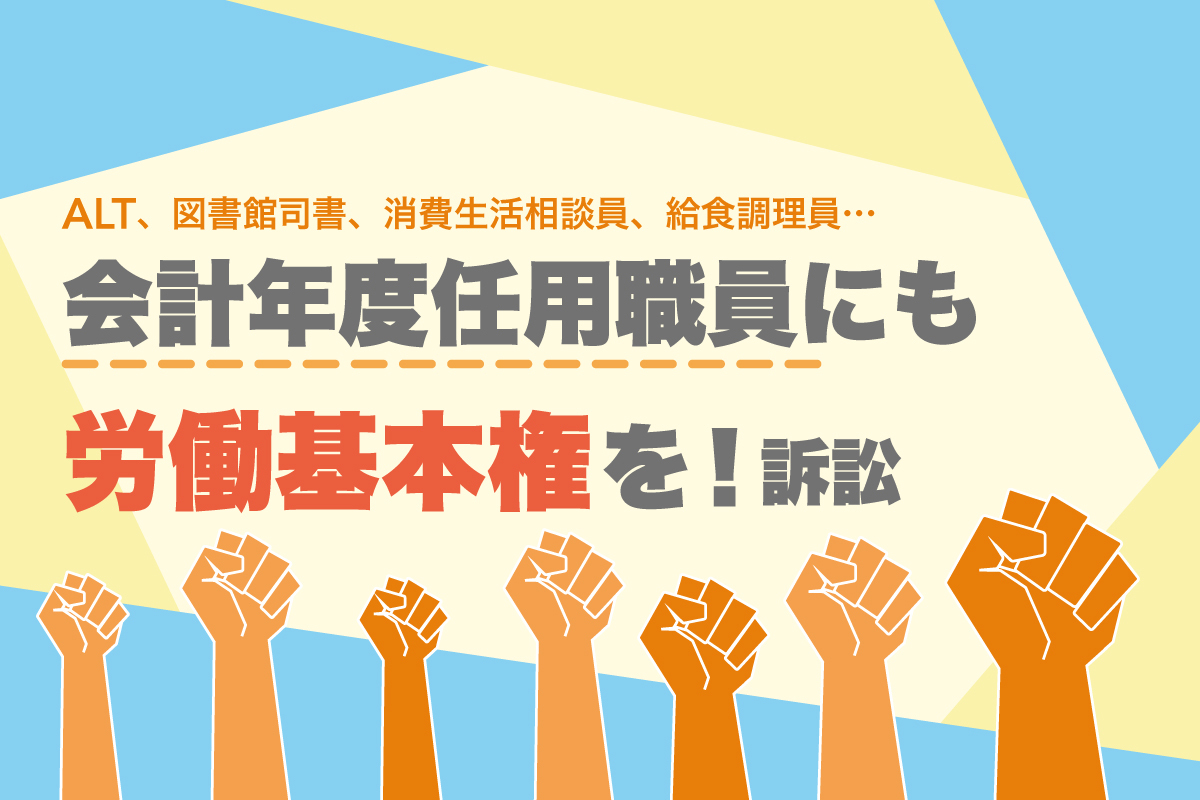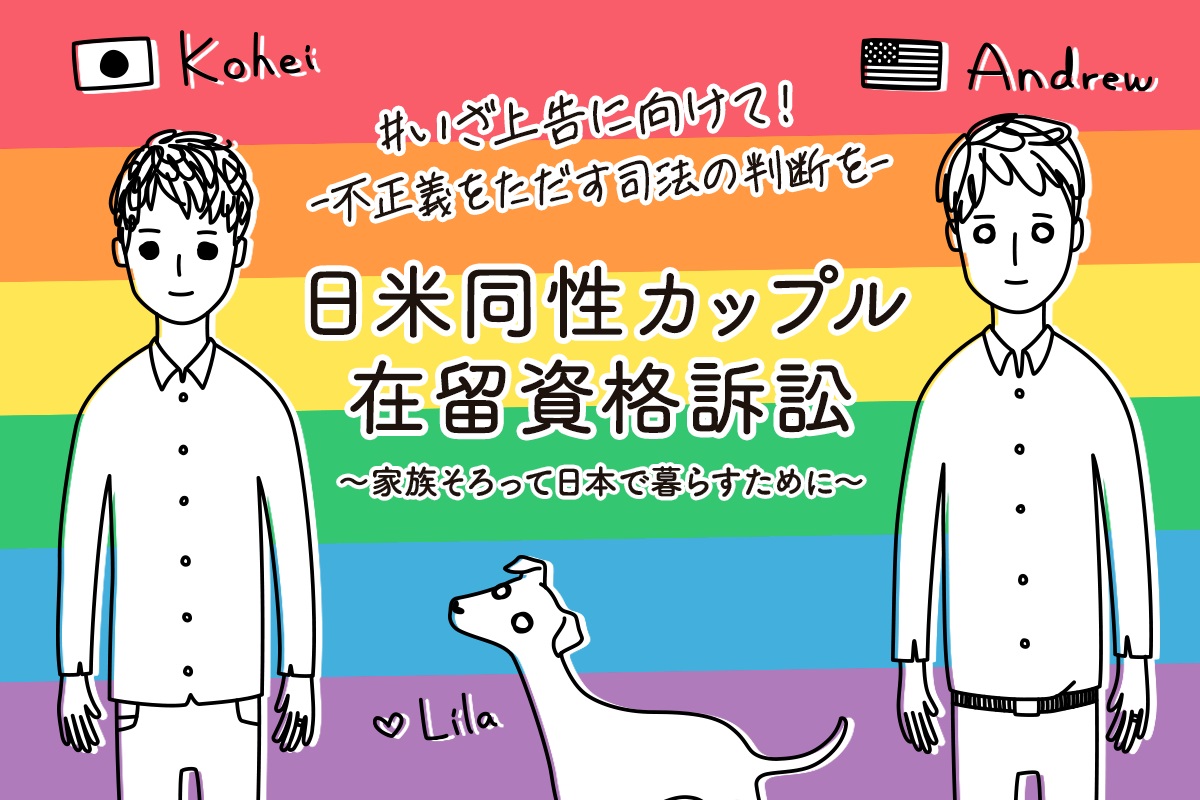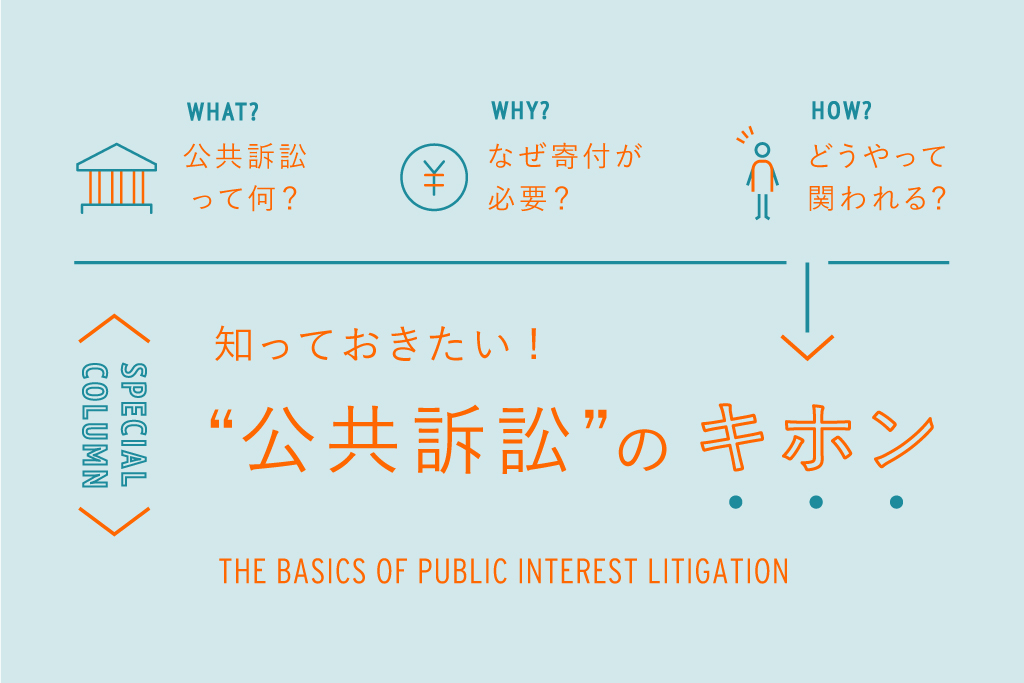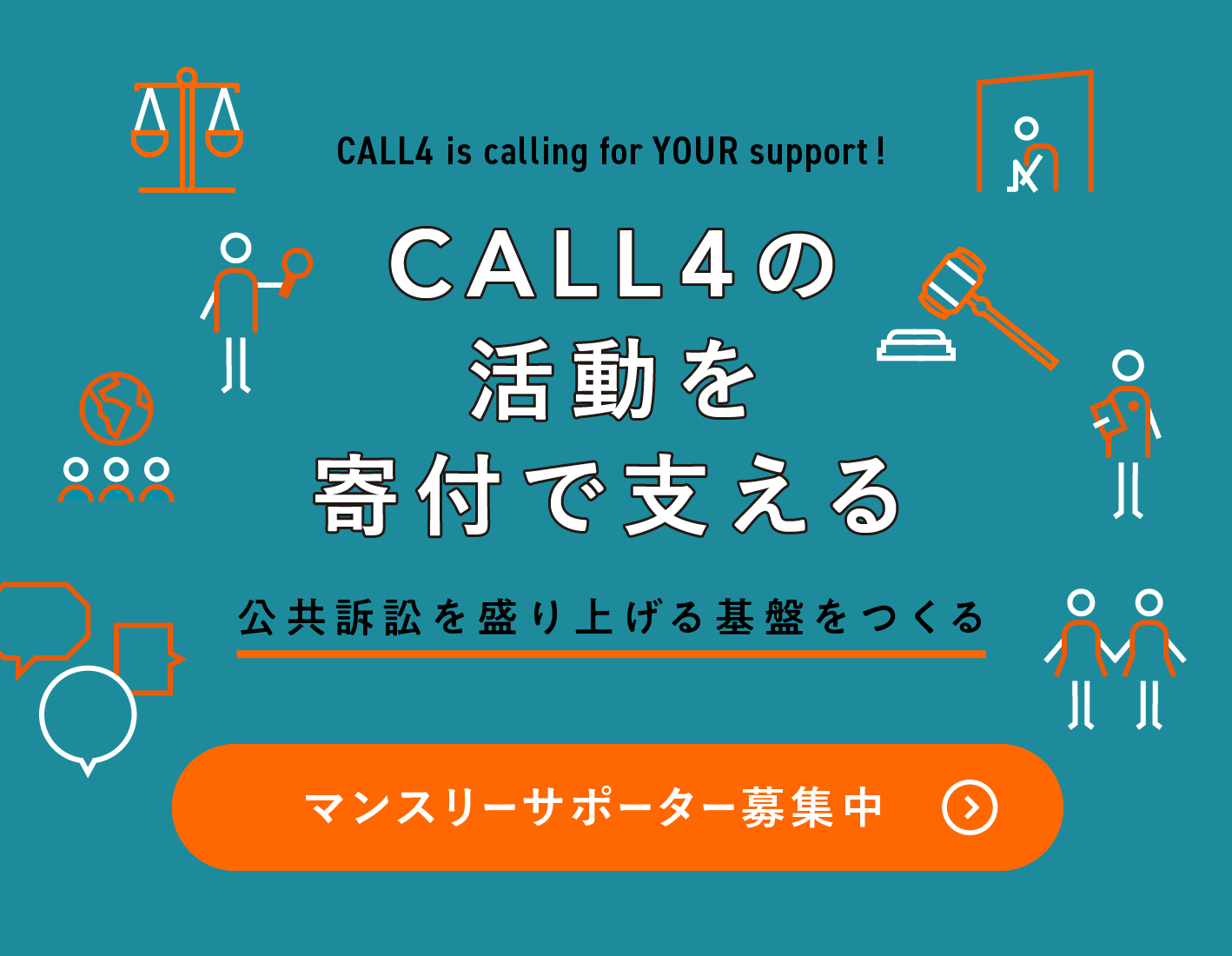難民帰化訴訟〜真に社会の一員へ〜 Refugee Naturalization Lawsuit -Truly Becoming a Member of Society-
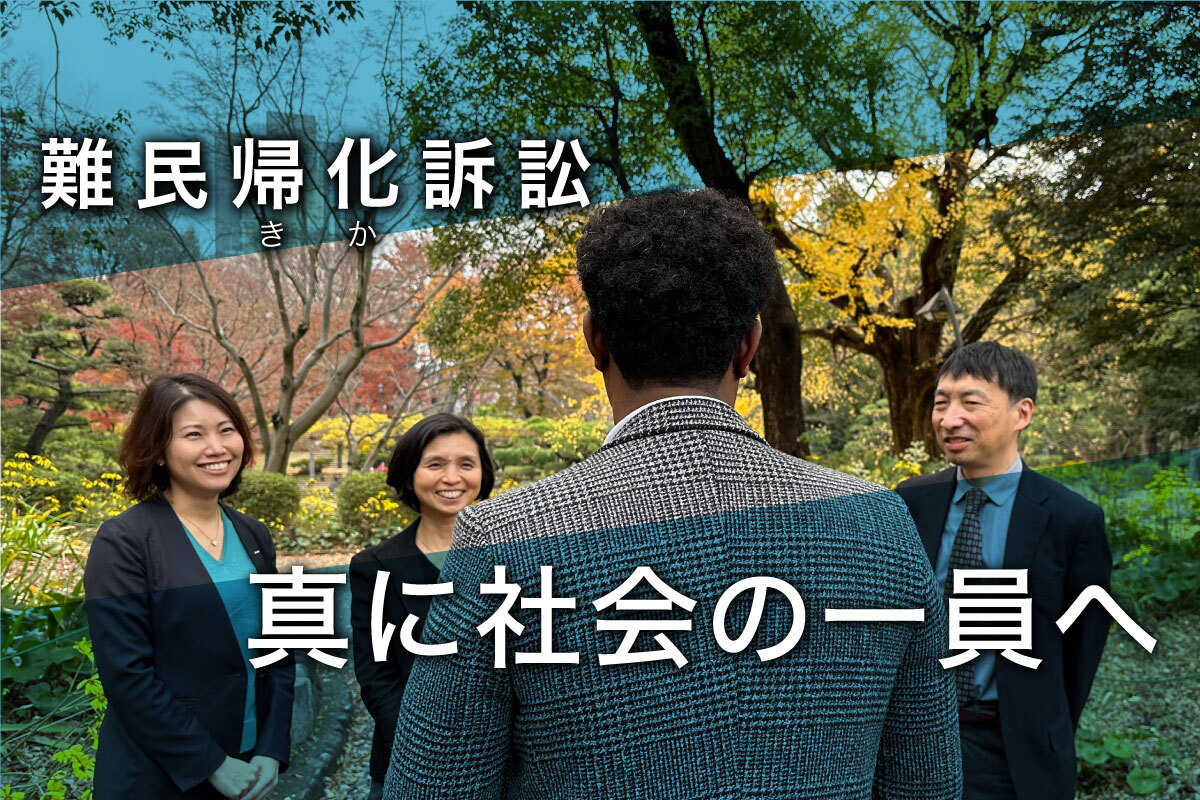
難民認定されたアフリカ出身の原告。日本国籍をもたない「難民」のままの日本での生活は、彼の日常生活や将来のキャリアに重大な障害となってきました。そのため行った2度の帰化申請は、いずれも認められず。難民条約34条は、難民の帰化をできるだけ容易にするように求めています。しかし日本では、国の極めて広い裁量で帰化の認否が決まり、これは条約の趣旨に反しています。この訴訟は原告に帰化を認めるよう求めています。 The plaintiff, an African refugee, lacks Japanese citizenship, hindering his daily life and future career in Japan. Despite two unsuccessful naturalization attempts, Japan’s broad discretion in naturalization decisions contradicts Article 34 of the Refugee Convention, which encourages easing refugees’ naturalization. This lawsuit aims to secure the plaintiff’s naturalization.
はじめに
原告は、アフリカの過酷な人権抑圧状態が続く国を逃れ、2015年に難民認定を受け、在留資格を獲得しました。しかし、難民認定による在留資格は原告が安心して生活し、能力を活かすために十分なものとは言えません。難民認定によって日本政府が発行する難民旅行証明書では、携帯電話の契約や銀行口座の開設などの日常生活の手続きすら、簡単に行うことはできません。旅券がないため、研究や会議のための海外渡航もままならず、自身の望むキャリア形成もできません。
このように、難民であるために祖国の保護は得られず、日本からも国籍国としての保護が得られないことは、原告が日常生活を送り、また、自分の夢を実現させる上で大きな障害として立ちはだかってきました。
そのため、日本国籍を得たいと、原告は2018年と2021年の2回帰化申請を行いましたが、いずれも不許可処分となりました。難民条約34条は、難民の帰化はできる限り容易であるべきと定めています。したがって難民条約の締約国である日本は、本来、難民の帰化の手続を容易にする義務があります。しかし、現状難民のための帰化条件の緩和措置はほとんどなく、条件を満たしている場合でも国の裁量で帰化の申請が認められないこともあります。
難民条約34条は、地球上に居場所のない難民に新たな国籍を与えることで、彼らに生きる希望をもたらすものです。この訴訟は、原告の日本への帰化を求めることを通じて、日本がこの条文に定められた義務を果たすことを求めています。
難民の地位に関する条約 第34条【帰化】
締約国は、難民の当該締約国の社会への適応及び帰化をできる限り容易なものとする。締約国は、特に、帰化の手続が迅速に行われるようにするため並びにこの手続にかかる手数料及び費用をできる限り軽減するため、あらゆる努力を払う。
事案の概要
難民には国籍を付与する制度である「帰化」が望まれています。
そこで難民の帰化を容易にするために、難民条約34条は締約国に「帰化をできる限り容易なものとする。」として、帰化の負担軽減を義務として定めています。
日本は1981年に難民条約に加入しており、1982年より条約が発効していますが、難民条約34条の規定を国内で実施するための法整備がいまだされていません。そのため、依然として、帰化の許可について権限を持つ法務大臣に幅広い裁量が与えられており、難民にとって帰化はハードルの高いものとなっています。
一方他国では、難民の帰化のハードルが下げられています。この訴訟にご協力いただいている難民研究フォーラムの調査結果によると、多くの国で住所条件」や「語学要件」において条件の緩和や免除が行われていることがわかりました。
参照:https://refugeestudies.jp/2024/02/naturalization/
原告は、2018年に1度目の帰化申請、国籍法上帰化が認められる前提となる要件をすべて満たした2021年に2度目の帰化申請を行いましたが、いずれも不許可であり、その理由も明らかにされていません。しかし、難民条約が定める34条の趣旨が考慮されたのであれば、帰化が認められたはずです。そのため、帰化申請に対する法務大臣による帰化不許可処分の取消しを求めています。
国連職員を志す原告は、現在日本の大学院の博士課程に在籍しており、研究や会議の出席のために海外渡航が必要となる機会が多くあります。
しかし、帰化が認められないために日本の旅券(パスポート)を取得することができず、難民旅行証明書を利用して渡航するしかありません。難民旅行証明書と旅券との差は著しく、渡航を断念せざるを得ないことも多々あり、将来の選択にも大きな制約となっています。
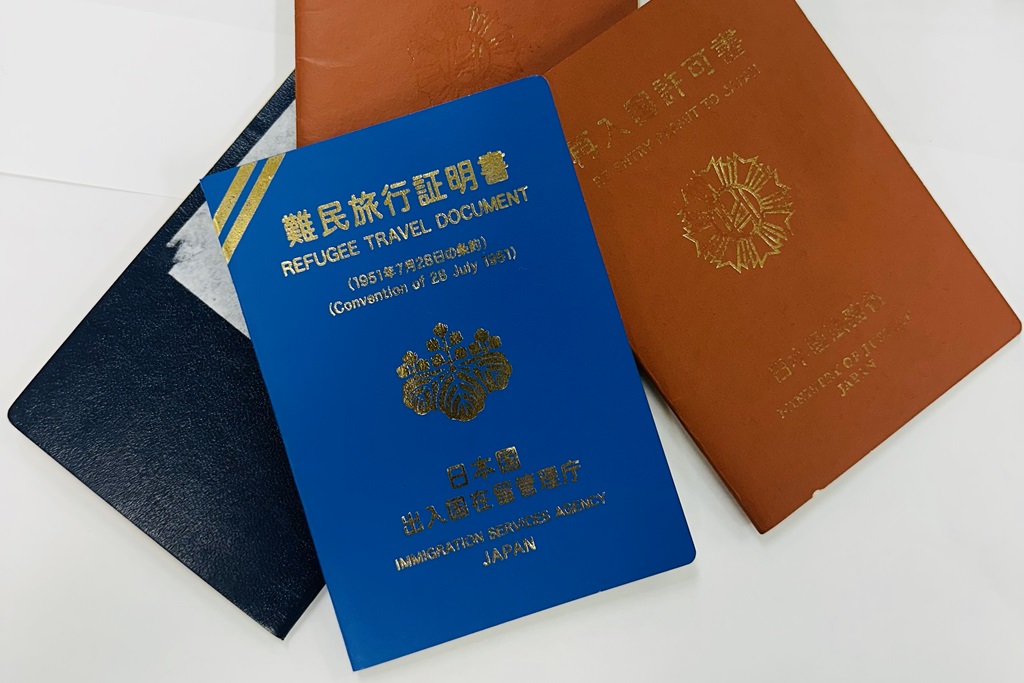
*注:難民旅行証明書とは、難民が渡航する際に携帯するパスポートのようなものですが、入国に査証を要する国の場合、別に査証の発給が必要となります。しかしこの査証を付与するか否かは入国する国政府の裁量によります。他方、旅券は、主に出入国時に必要となる証明書で、日本は70カ国に旅券一つで入国できます(令和5年9月30日現在)。
訴訟の社会的意義
この訴訟は、自国民として保護してくれる国がない人の帰化でさえ、国が自由に決めてよい、理由も言わなくてよいという状況、そして、難民が自分の経験や能力を活かして生きていくことが制度によってかなわないという状況を変えることを目指しています。
日本では帰化は国の自由な裁量であるという考えのもとに、帰化が不認定とされた場合も、その理由すら明らかにされないという状態が当然とされてきました。
難民やその子どもなど、帰化によって日本国籍を得ることができなければ、事実上保護してくれる国籍国がない場合ですら、不許可の理由は明らかにならないのが現状です。
これでは、「帰化をできる限り容易なものとする」という難民条約上の国の義務も果たされているとはいえません。
私たちは、公に明かされていない「帰化」の手続の中身を明らかにし、難民条約34条の趣旨に適う制度にすることで、難民やその子どもなどが、保護してくれる国籍国がない状況に放置され、生き方や将来に制約が課せられる現状を変えたいと思います。
原告の思い
難民として私は10年間日本に住んでいます。私は日本にやってきて、ここでさらなるキャリアを築くために努力して、修士号を取得し現在博士課程に在籍しています。しかし、渡航制限やパスポートの問題によって、国際会議に参加したり、世界中の研究者と協働したりすることが難しく、学術的そしてキャリア面での発展の機会が大幅に制約されていると感じます。
訴訟提起を決意したのは、このような不利益と差別に終止符を打つためです。訴訟に至るまでは、不安と決意の両方を感じていました。勝訴できるかわからないという不安が私の心に重くのしかかり、他のことが手につきませんでした。しかし、心の奥底で、正しさを貫くことが私の唯一の選択肢であるとわかっていたので、法的闘争に立ち向かうことができました。私はこの訴訟で、私自身だけでなく、私と同様の不正義を経験したすべての人々のために戦っていると考えています。誰にでも夢を持ち、かなえる権利がある、また、他の人々のためにも、より安全で公平な環境を作るのだ、と考えることで、私は前進するための勇気を持つことができました。
資金の使途
訴訟提起のための必要経費:印紙代・コピー代などの実費費用
学者に依頼する意見書費用:専門分野ですので、憲法学者や行政法学者等の専門家に意見書を執筆していただくことを予定しています
弁護士費用:弁護団員の着手金、成功報酬、出張日当等
翻訳・通訳費用:訴訟資料作成や法廷での発言のために原告の言語から日本語へ、日本語から原告の言語への翻訳・通訳費用がかかります
イベント開催・広報費用:この裁判に関するイベントや広報費用にも寄付金を用いたいと考えています
弁護団からのメッセージ
原告は、自身の経験を活かし、国際機関で働きたいという夢を持っています。
難民認定後、ようやく今後の道が開けると思っていましたが、現在も帰化が認められず、パスポートがないために、その夢に向かって進むことが許されません。
しかも、帰化を認めない理由すら全く明らかにされません。難民条約上の義務を処分に当たって考慮したのかさえ分かりません。
この状況を何とかしたいと思い、彼と一緒に裁判を闘うことにしました。
弁護団について
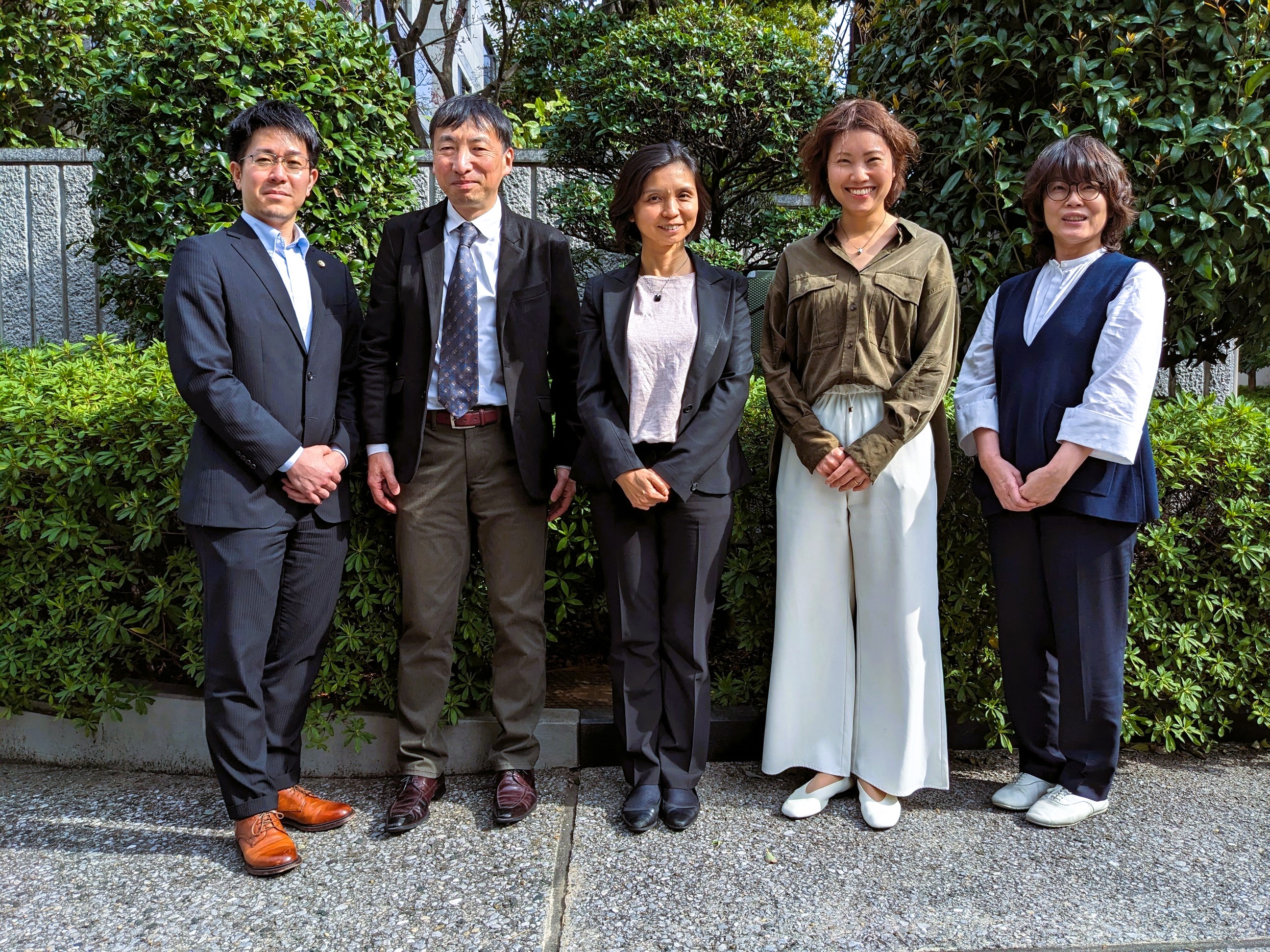
関 聡介 東京弁護士会 銀座プライム法律事務所
鈴木 雅子 東京弁護士会 いずみ橋法律事務所
小田川 綾音 第一東京弁護士会 いずみ橋法律事務所
髙見 智恵子 東京弁護士会 東京中央法律事務所
俵 公二郎 東京弁護士会 弁護士法人東京パブリック法律事務所
おわりに
原告は夢に向かって努力を重ねています。けれども、難民認定されてもなお、国民としてはどこからも保護されない状況が続いています。
難民条約に加入しているにもかかわらず、自由裁量という名目で難民の帰化を容易に認めず、かつその理由すら明らかにしない日本の状況は改められるべきです。
裁判は既に始まっています。彼が理由も明らかにされないまま帰化を拒否されることで受けてきた損害の賠償を求める申し立てもしています。
ようやく難民と認定された後も国籍国として保護する国を持つことができず、パスポートもなく、自分の能力や経験を存分に活かすことができないという状況を変えていくため、どうか、応援よろしくお願いします。
*Translated by Google translate
Introduction
The plaintiff fled human rights violations in their homeland and arrived in Japan. He was granted refugee status in 2015 and obtained residency status. However, the residency status granted through refugee recognition is not sufficient for the plaintiff to live comfortably and utilize their abilities. The refugee travel document issued by the Japanese government does not even make everyday procedures such as cellphone contracts or opening bank accounts easy. Due to the lack of a passport, international travel for research or conferences is not feasible, hindering the plaintiff's desired career path.
Thus, being unable to receive protection from their homeland due to being a refugee, and not obtaining protection as a citizen of Japan, has posed a significant obstacle to the plaintiff's daily life and pursuit of their dreams.
Therefore, the plaintiff applied for Japanese citizenship twice in 2018 and 2021 in hopes of obtaining it, but both applications were denied. Article 34 of the Refugee Convention stipulates that refugee naturalization should be facilitated as much as possible. Hence, Japan, being a signatory to the Refugee Convention, has an obligation to make the naturalization process easier for refugees. However, currently, there are hardly any measures to ease naturalization conditions for refugees in Japan, and even if the conditions are met, naturalization applications may not be approved at the discretion of the government.
Article 34 of the Convention Relating to the Status of Refugees [Naturalization]
The contracting states shall, as far as possible, facilitate the assimilation and naturalization of refugees. They shall make every effort to expedite naturalization proceedings and reduce the fees and costs of such proceedings, with a view to making these proceedings as rapid and inexpensive as possible.
Overview of the case
The plaintiff fled a country plagued by severe human rights abuses in Africa and was granted refugee status in Japan in 2015.
For refugees, the system of "naturalization." which grants citizenship, is desired. To facilitate the naturalization of refugees, Article 34 of the Refugee Convention obliges contracting states to make naturalization as easy as possible. Japan became a signatory to the Refugee Convention in 1981, and the treaty has been in effect since 1982. However, there has been no legislative framework established domestically to implement the provisions of Article 34. Consequently, the Minister of Justice, who holds broad discretion over naturalization approvals, still faces hurdles for refugees seeking naturalization in Japan. Conversely, in other countries, the barriers to refugee naturalization have been lowered. According to research conducted by the Refugee Studies Forum, many countries have relaxed or exempted conditions such as residency requirements and language proficiency. (Reference: https://refugeestudies.jp/2024/02/naturalization/)
The plaintiff submitted their first naturalization application in 2018 and a second one in 2021, having met all the prerequisites for naturalization under the Nationality Act. However, both applications were denied, with reasons undisclosed. If the spirit of Article 34 of the Refugee Convention had been considered, naturalization should have been granted. Therefore, the plaintiff seeks the cancellation of the Minister of Justice's refusal to naturalize their application.
Aspiring to work for the United Nations, the plaintiff is currently enrolled in a doctoral program at a Japanese graduate school. They often require international travel for research and conference attendance. However, due to the lack of naturalization approval, they are unable to obtain a Japanese passport and can only travel using a refugee travel document. The difference between a refugee travel document and a passport is significant, often leading to the abandonment of travel plans and imposing significant constraints on future choices.
Furthermore, procedural issues arise in daily life, such as difficulties in opening bank accounts and contracting cell phones or credit cards.

*Note: A refugee travel document is similar to a passport carried by refugees when traveling. However, for countries requiring a visa for entry, a separate visa issuance may be necessary. Whether or not to grant this visa is at the discretion of the receiving country's government. On the other hand, a passport is primarily a document required for entry and exit, and with a Japanese passport, entry is allowed to 70 countries with just one passport as of September 30, 2023.
Procedural issues also arise in daily life, such as difficulties in opening bank accounts and contracting cell phones or credit cards.
Social significance of the lawsuit
This lawsuit aims to change the situation where even the naturalization of individuals who have no country to protect them as their own citizens is left to the discretion of the government without any explanation necessary. Furthermore, it aims to address the situation where refugees are unable to live and utilize their experiences and abilities due to institutional constraints.
In Japan, naturalization has been regarded as entirely at the discretion of the government, and it has been considered natural for reasons for denial to remain undisclosed.
Currently, even in cases where individuals, including refugees and their children, are unable to obtain Japanese nationality through naturalization, the reasons for denial remain undisclosed, even in cases where there is effectively no country to protect them.
This situation does not fulfill the obligation of countries under the Refugee Convention to make naturalization as easy as possible.
We aim to change the current situation where individuals, including refugees and their children, are left in a state of having no country to protect them, and their way of life and future are constrained. We intend to achieve this by disclosing the undisclosed procedures of "naturalization" and establishing a system that conforms to the spirit of Article 34 of the Refugee Convention.
Message from Plaintiff
As a refugee, I have been living in Japan for 10 years. I came to Japan and worked hard to build my career further, obtaining a master's degree and currently enrolled in a doctoral program. However, due to travel restrictions and passport issues, I find it challenging to participate in international conferences or collaborate with researchers worldwide, significantly limiting opportunities for academic and career development.
I decided to initiate legal action to put an end to such disadvantages and discrimination. Until the lawsuit was filed, I felt both anxious and determined. The uncertainty of winning weighed heavily on my heart, making it difficult to focus on anything else. However, deep down, I knew that sticking to what is right was my only option, so I was able to confront the legal battle with determination. I believe that in this lawsuit, I am fighting not only for myself but also for all those who have experienced similar injustices. By believing that everyone has the right to have and pursue their dreams, and by striving to create a safer and more equitable environment for others, I found the courage to move forward.
Use of donations
Expenses required for filing a lawsuit : Actual expenses such as stamp duty and copying fees
Cost of written opinion requested from scholars : Because this is a specialized field, we plan to have experts such as constitutional and administrative law scholars write the opinion.
Attorney's fees : attorney's retainer, contingency fee, travel allowance, etc.
Translation and interpretation costs : Translation and interpretation costs will be incurred from the plaintiff's language to Japanese and from Japanese to the plaintiff's language in order to prepare legal documents and speak in court.
Event hosting and PR costs : We would like to use donations to hold events and cover PR costs related to this trial.
Message from the Counsel
The plaintiff dreams of using his experience to work for an international organization.
After being recognized as a refugee, he thought that his future would finally open up, but since he has still not been naturalized and does not have a passport, he is not allowed to move forward towards his dream.
Moreover, the reasons for not granting naturalization are not even made clear. It is unclear whether the government even took into consideration the obligations under the Refugee Convention when making its decision.
I wanted to do something about this situation so I decided to join him in the lawsuit.
About the legal team

Sosuke Seki Tokyo Bar Association Ginza Prime Law Office
Masako Suzuki Tokyo Bar Association Izumibashi Law Office
Ayane Odagawa Daiichi Tokyo Bar Association Izumibashi Law Office
Chieko Takami Tokyo Bar Association Tokyo Central Law Office
Tawara Kojiro Tokyo Bar Association Tokyo Public Law Office, LPC
Call for donations
The plaintiff has been striving towards their dream with relentless effort. Even now, after being recognized as a refugee, the situation of not receiving protection as a citizen of Japan does not provide a stable legal status as a dignified individual.
Despite being a signatory to the Refugee Convention, Japan's position of not recognizing refugee naturalization under the guise of discretionary powers should be reconsidered in light of this case.
The trial has already begun. Additionally, considering the damages he has suffered, we have also filed for state compensation.
Unable to obtain a country to protect him as a citizen even after finally being recognized as a refugee, and without a passport, he cannot fully utilize his abilities and experiences. To change this situation, your support is greatly appreciated.
〈連絡先〉
〒171-0022
東京都豊島区南池袋2-49-7 池袋パークビル4階
弁護士法人東京パブリック法律事務所
弁護士 俵 公二郎
Refugee Naturalization Lawsuit Legal Team
〈Contact information〉
〒171-0022
東京都豊島区南池袋2-49-7 池袋パークビル4階
弁護士法人東京パブリック法律事務所
Tokyo-to, Toshima-ku, Minami-Ikebukuro, 2-49-7
Ikebukuro Park Building 4th floor
Tokyo Public Law Office, LPC
Attorney at law TAWARA Kojiro
あなたにおすすめのケース Recommended case for you
- 外国にルーツを持つ人々 Immigrants/Refugees/Foreign residents in Japan
- ジェンダー・セクシュアリティ Gender/Sexuality
- 医療・福祉・障がい Healthcare/Welfare/Disability
- 働き方 Labor Rights
- 刑事司法 Criminal Justice
- 公正な手続 Procedural Justice
- 情報公開 Information Disclosure
- 政治参加・表現の自由 Democracy/Freedom of Expression
- 環境・災害 Environment/Natural Disasters
- 沖縄 Okinawa
- 個人情報・プライバシー Personal information/Privacy
- アーカイブ Archive
- 全てのケース ALL
